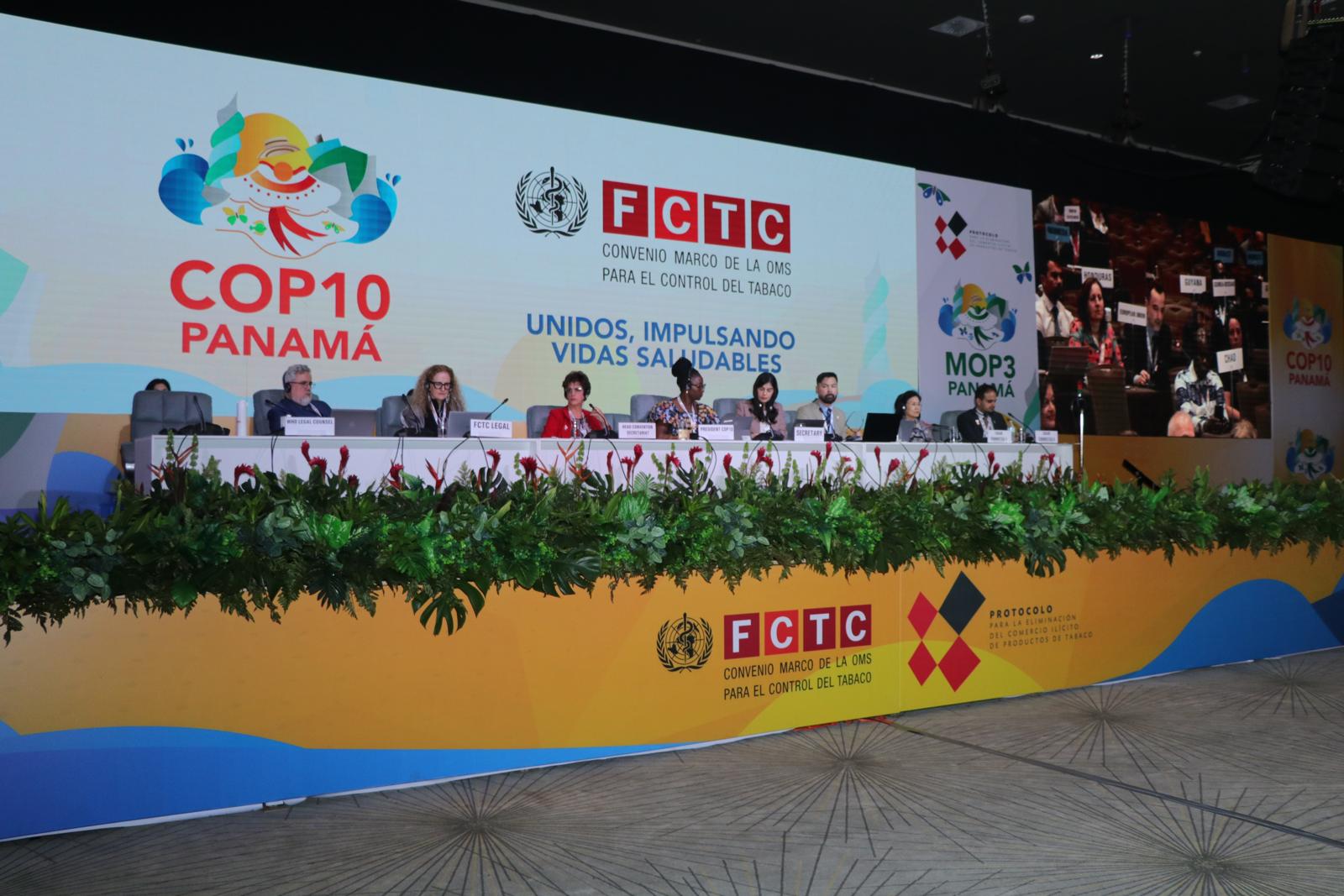
By Raquel Gurgel | 29 February, 2024

Photo: WHO FCTC Secretariat
The Tenth session of the Conference of the Parties (COP10) to the WHO Framework Convention on Tobacco Control (WHO FCTC) took an historic decision, based on the draft decision proposed by Brazil, Ecuador, and Panama, to take account of the environmental impacts from the tobacco production chain, from cultivation to waste disposal of tobacco products and related electronic devices. It extends the understanding of Article 18 of the Treaty, which until now has been limited to the cultivation and manufacture of tobacco and its products and has not been addressed by non-producing countries.
The decision addresses the issue of cigarette filters, encouraging Parties to consider regulatory options regarding them. Cigarette filters are typically composed of cellulose acetate which generate microplastics, and they contain nicotine and other toxic chemicals they have absorbed.
"Filters are widely spread in the environment, killing microorganisms and marine life, contaminating the oceans, and capable of affecting animal biodiversity. In fact, cigarette butts are the most discarded waste worldwide, with approximately 766.6 million kilograms each year," says Reina Roa, from the Ministry of Health of Panama, one of the co-sponsors of the draft decision. More than 4 trillion cigarette butts are discarded annually worldwide.
Furthermore, the document invites Parties to make the tobacco industry pay for the damage it causes to the environment and its health effects on workers, in accordance with Article 19 of the WHO FCTC. Parties are also urged to protect tobacco-related environmental policies from the tobacco industry’s interests, since its greenwashing strategies are well-known.
The Convention Secretariat committed to examine regulatory options regarding tobacco products’ waste prevention and management, including a ban on plastic filters. Together with the WHO FCTC Knowledge Hub for Articles 17 and 18, it will prepare a report on plastic waste generated by the tobacco industry and the options that Parties may have to curb or prevent such harm.
Turning point for Article 18
Since the inception of the Treaty, Articles 17 and 18 of the Convention, addressing alternatives to tobacco production and concerns for the environment and the health of workers, have consistently been considered together, exclusively focusing on producing countries.
This is due to the emphasis given to tobacco production in both articles: Article 17 discusses “economically viable alternatives for tobacco workers, growers and, as the case may be, individual sellers," while Article 18 emphasizes the “protection of the environment and the health of persons in relation to the environment in respect of tobacco cultivation and manufacture.”
Due to their restriction to tobacco-producing territories, neither of them has much visibility among the Parties, including in COP discussions. Today, few Parties have significant tobacco production – only five had produced more than 100,000 tones of unmanufactured tobacco leaves in 2022, according to the Food and Agriculture Organization of the United Nations (FAO): China, India, Brazil, Zimbabwe and Pakistan.
Furthermore, in recent years, production has shifted to low- and middle-income countries. The following two graphs illustrate a significant change in the top 15 producers over a span of 40 years:


Low- and middle-income countries are more economically dependent on this cultivation. “Therefore, interest in Article 17 has gradually waned – and, consequently, in Article 18, which has always been seen as entirely linked to it," points out Vera Luiza da Costa e Silva, executive Secretary of the National Commission for the Implementation of the Framework Convention (CONICQ) in Brazil and member of the Brazilian delegation ate COP10.
According to her, at the time the Treaty was created, the impacts of tobacco cultivation on workers' health and the environment were already clear – for instance, Green Tobacco Sickness and health issues related to pesticide use were well-known, as were data on deforestation caused by the extraction of wood needed for curing the leaves in barns. However, little was said about the environmental problems generated post-consumption. "It was thought that those who do not produce tobacco did not have environmental problems related to it. But time showed that it was not like that,” she says.
With the new decision, which sheds light on the environmental impacts of post-consumption of tobacco products and electronic devices, Article 18 ceases to be an exclusive concern of tobacco-producing countries and becomes important for all Parties.
Legal implications
The Conferences of the Parties can regularly make decisions necessary to promote the effective implementation of the Convention. According to the Secretariat of the WHO FCTC, all decisions carry equal weight and reflect a consensus reached by the Parties. Although COP decisions are not legally binding, they may be used by Parties to support national laws and regulations.
The new decision highlights the links between Article 18 and the environmental damage caused by tobacco waste and urges Parties to take this damage into account. "Thus, the decision can generate necessary changes in the application of this Article," explains lawyer Breno Gaspar, a researcher at the WHO FCTC Knowledge Hub for Articles 17 and 18 and a member of the Brazilian delegation at COP10.

According to Andrés Benavides, from the Ministry of Health of Ecuador, which co-sponsored the draft decision, the effects could occur very soon in his country: "Our Organic Law for the Regulation and Control of Tobacco and its regulations address environmental protection, and we needed some form of decisions that strengthen the implementation of Article 18 of the WHO FCTC so that we can explore some regulatory possibilities in our country," he says, adding: "The issue may begin to gain much more relevance with the approval of this decision, and we can start to articulate with the Interinstitutional Committee for Tobacco Control to include in the agenda the importance of pollution caused by cigarette butts and any other tobacco-related waste or electronic product."
According to Vera da Costa e Silva, the decision can stimulate discussions in the UN Plastics Treaty negotiations – which are scheduled for April 2024. "The COP10 decision reinforces the importance of including cigarette plastic filters as significant components in the generation of microplastics in the environment during the plastic treaty negotiations," she says. Panama, which already has regulation governing the destruction of tobacco products and their toxic residues, also hopes to address the issue during the negotiations. "This is a great opportunity to address this major problem we face to protect environmental health and population health," evaluates Reina Roa.
Additional impact: Strengthening of Articles 17 and 19
In Vera da Costa e Silva's view, the decision also merits touching upon two other articles whose implementation by the Parties is currently low: Article 17, which regards viable alternatives for workers, and Article 19, which addresses liability.
The document includes explicit references to both articles: it invites all Parties to “strengthen the implementation of Article 17” and to hold the tobacco industry accountable for its environmental impacts, adverse health effects on workers, and the disposal and treatment of waste resulting from tobacco product manufacture and consumption, “under Article 19 of the WHO FCTC”.
These two articles are not widely recognized, either because many countries are not tobacco producers – and consequently not interested in building alternatives to tobacco farming – or due to concerns about entering into conflicts with the industry, particularly in the case of Article 19. Since the new decision encompasses all Party countries, when it mentions Articles 17 and 19, it brings back to the COP the agenda of these two articles. “This is another important aspect of the decision," Vera da Costa e Silva concludes.
*
The information and views set out on this news are those of the author(s) and do not necessarily reflect the opinion of the Parties to the WHO Framework Convention on Tobacco Control (WHO FCTC), the Parties to the Protocol to Eliminate Illicit Trade in Tobacco Products, or the Secretariat of the WHO FCTC.
